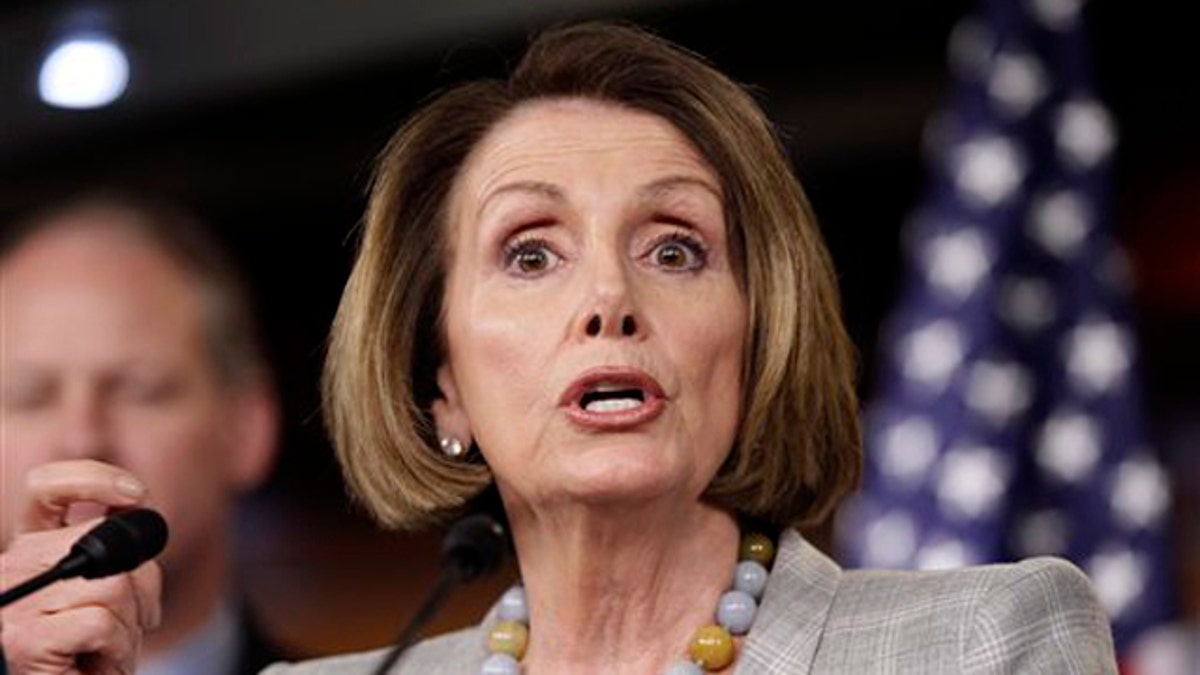
House Minority Leader Nancy Pelosi speaks to reporters June 16 on Capitol Hill in Washington. (AP)
President Obama is facing an insurgency -- from his own party -- over his plan to withdraw more than 30,000 troops from Afghanistan by the end of next summer.
While some Republicans are nervous about the possibility of a precipitous drawdown, a number of prominent Democrats criticized the president for not bringing the troops home quickly enough.
Underscoring the difficulty the president will have keeping Congress on board for a war that is expected to last well beyond his current term in office, that criticism is coming from the top down in the Democratic caucus.
House Democratic Leader Nancy Pelosi gently, but clearly, chided the president over his Afghanistan announcement Wednesday night.
"It has been the hope of many in Congress and across the country that the full drawdown of U.S. forces would happen sooner than the president laid out -- and we will continue to press for a better outcome," she said in a statement.
On Thursday, House Democrats unloaded on the president's withdrawal plan, calling it an unnecessary drain on the country's finances and military.
"The president called for three-and-a-half more years of war in Afghanistan, for what?" asked Rep. Jerrold Nadler, D-N.Y. "The whole premise of this war is wrong."
The Democrats said it is time for an expedient withdrawal from the nation that they allege is in a civil war. Barring new negotiations to end U.S. involvement, members said that the next move would be to force the administration's hand via the appropriations process. "We're reaching the breaking point in both parties in giving the president a blank check," Nadler said, adding that there will be several amendments to a Pentagon spending bill for 2012 that is scheduled to be on the floor this week.
Sen. Ben Cardin, D-Md., also said the withdrawal "should be sped up."
Under the president's plan, 10,000 troops will be withdrawn by the end of this year. Obama said the rest of the surge troops, or about 23,000, will be removed by the end of summer in 2012. It is expected that all surge troops will be out of Afghanistan by September next year.
As the president faces bipartisan pressure to get out of Afghanistan, he also faces bipartisan pressure not to leave too quickly.
Rep. Mike Rogers, R-Mich., chairman of the House Intelligence Committee, expressed concern that the withdrawal plan would put too much of a burden on the remaining troops and "increase risk in a number of areas."
House Speaker John Boehner said Wednesday he'd be "concerned about any precipitous withdrawal" from Afghanistan.
"We all want to bring our troops home as quickly as possible, but we must ensure that the gains we've made are not jeopardized," Boehner said after the speech, urging the president to take into account the advice of commanders on the ground.
Sen. Bill Nelson, D-Fla., in a YouTube video cut before the president's speech, said Obama has "the right idea about starting a withdrawal" without allowing "the terrorists to gain safe haven elsewhere in the region."
The president, in framing the drawdown, tried to appeal to competing factions on Capitol Hill and elsewhere over the war. To those urging the president to cut the mission short and withdraw forces at a more rapid pace, Obama affirmed that his interest is "nation-building here at home," not in Afghanistan.
"We won't try to make Afghanistan a perfect place. We will not police its streets or patrol its mountains indefinitely," he said.
But to those concerned the impending withdrawal could leave Kabul ill-equipped to keep the Taliban at bay and extremist elements out, Obama vowed not to let Afghanistan again become a "safe haven" for terrorists.
He touted the recent death of Usama bin Laden as a "victory for all who have served since 9/11," and he claimed intelligence recovered from the terror leader's Pakistan compound revealed that Al Qaeda is under "enormous strain." Obama said bin Laden had expressed concern that Al Qaeda could not replace senior leaders who were killed and was struggling "to portray America as a nation at war with Islam."












































